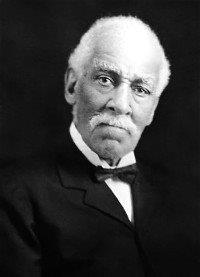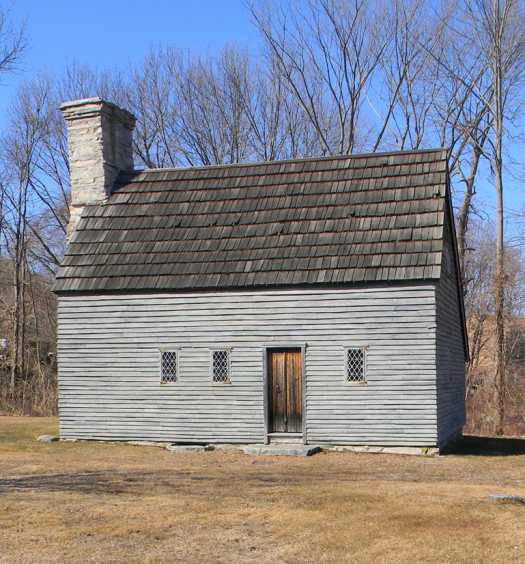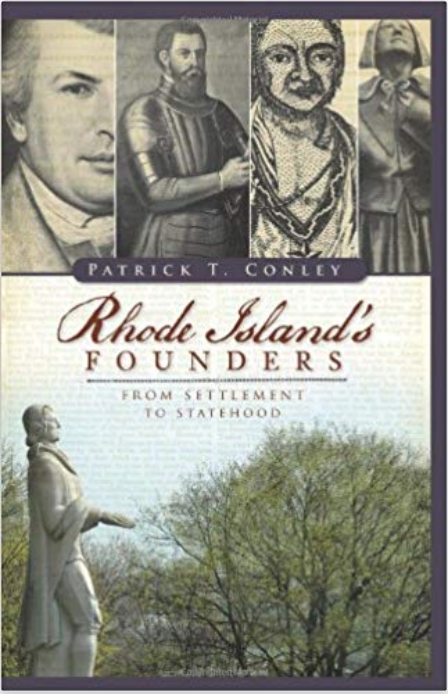In Rhode Island, slavery was placed on the road to extinction on March 1, 1784, when the General Assembly passed a gradual manumission act making any black born to a slave mother after that date free. Those who were slaves at that time had to be manumitted by their masters. Five such slaves were listed in the federal census of 1840, and not until the implementation of the state constitution of 1843 was slavery banned outright in Rhode Island. Free blacks with real estate could vote until 1822, when they were deprived of suffrage by statute. This restriction was erased by the constitution of 1843, in part to reward blacks for their support of the prevailing Law and Order government.
With blacks politically impotent, socially ostracized, educationally segregated during the nineteenth century, and many enslaved during the eighteenth century, it is understandable that very few black leaders emerged in Rhode Island up to the antebellum era. George Thomas Downing was one notable exception.
Downing was born in New York City on December 30, 1819. His father, Thomas, was a native of coastal Virginia, and his mother, Rebecca West, came from Philadelphia. George, the eldest child, had three brothers and a sister. He was fortunate in that his father established a very upscale and successful New York City restaurant, whose patrons included many of the prominent businessmen and politicians of the metropolis. This success allowed George to attend private school, as well as the Mulberry Street School, where he met several young boys who would soon become vocal abolitionists, like George himself. When he was only fourteen, George and his black schoolmates—James McCune Smith, Henry Garnet, Alexander Crummel and Charles and Patrick Benson—formed a literary society and also discussed racial issues in America. At one of their meetings, they agreed not to celebrate the Fourth of July because it was “a perfect mockery” for African Americans.
George displayed such intellectual and leadership potential that his father sent him to Hamilton College in Clinton, New York, where he met and married Serena Leanora de Grasse, the daughter of a German mother and a father from India. Upon his return from Clinton, he joined with his father not only in the food business but alsoin the business of promoting racial justice. Both became active in the Underground Railroad, personally helping several fugitive slaves escape to freedom, and they lobbied the New York legislature to grant equal suffrage to blacks. Then, George struck out on his own.
In 1846, he came to Newport, a town that had a sizable black community, to replicate his father’s oyster-house restaurant. This enterprise proved successful in a town that had begun to emerge as a fashionable summer resort and which was attracting some of his father’s New York patrons. Downing wasted little time expanding his operations. In 1850, he moved temporarily to Providence, where he established a catering business for that city’s polite society. Then he turned his attention again to Newport, and in 1854–55, with some financing from his father, he built his impressive Sea Girt House on South Touro Street (now part of Bellevue Avenue), nearly opposite the Newport Tower. The multistory Sea Girt House included his residence, a restaurant, his catering business and “accommodations for gentlemen boarders.” A suspicious fire destroyed the elegant building in 1860, but Downing was able to recover $40,000 of insurance proceeds to rebuild a larger structure on the site, which came to be called the Downing Block. During the Civil War, he rented its upper floor to the temporarily relocated U.S. Naval Academy as an infirmary.
Downing’s business success, remarkable as it was, would not confer on him the status as the state’s greatest African American leader in its history, but his successful campaigns against slavery and school desegregation in Rhode Island do earn him that distinction. He vigorously opposed the African colonization plan supported by Thomas Hazard, but he assisted the efforts of local abolitionists, such as Arnold and Elizabeth Buffum, and national leaders of this movement, including U.S. Senator Charles Sumner of Massachusetts and ex-slave and famed orator Frederick Douglass. Although somewhat of a black elitist, Downing regarded himself as evidence of a black person’s ability to succeed and prosper if afforded education and the equal opportunity to do so.
In his quest for human rights, Downing was most uniquely associated with the desegregation of Rhode Island’s public schools, a campaign he commenced in 1855 with the support of Senator Sumner. By 1857, he had begun to take bold public action, launching a lobbying campaign, which he personally financed, against segregated education. Among other arguments, Downing appealed to the white leadership of the state by reminding them not only of the heroics of Rhode Island’s black regiment during the Revolutionary War but also of the assistance that blacks had rendered to the victorious Law and Order Party during the Dorr Rebellion. Such rhetoric did not sit well with Rhode Island’s Irish Catholics, but constitutional restrictions on their suffrage kept those residents of the state politically impotent. During the Civil War, Downing served as a recruiter for the black Massachusetts Fifth Cavalry.
Downing’s desegregation campaign had some near misses, but it took the ratification of the Thirteenth Amendment in 1865 to overcome the resistance of such communities as Providence, Bristol and Downing’s own Newport. Downing’s oft-repeated argument was that all race distinctions stemmed from slavery, and thus they must die with slavery. In 1866, eleven years after Downing first strategized with Sumner, the General Assembly, with little debate, overwhelmingly voted to outlaw separate schools and ended the era of legal educational segregation in Rhode Island.
Downing continued his racial-equality crusade in the decades following the Civil War. In 1866 he was selected, along with Frederick Douglass, by a convention of black leaders to meet with President Andrew Johnson at the White House to press him for legislation to enforce voting by blacks nationwide, including in the South. Downing read a short address to Johnson at the February 7 meeting, but the racist president rejected the request. Downing’s effort attracted national attention, including a Memphis, Tennessee newspaper editor who charged that black Americans and their white allies intended “to raise ten thousand dollars” to finance the Washington lobbying efforts “of Geo[rge] Downing (nigger).” In 1869, he helped to form the Colored National Labor Union because of the refusal of the all-white National Labor Union to admit blacks. By the late 1870s, he had become disenchanted with the Republican Party for abandoning Reconstruction and criticized what he called “the blind adhesion of the colored people to one party.” He failed, however, in three attempts to secure election as a Newport Democrat to the Rhode Island General Assembly, leaving the honor of becoming the state’s first African American legislator to the Reverend Mahlon Van Horne, a Newport Republican, who was elected to the House for three consecutive one-year terms, beginning in 1885.
Downing’s most visible job mixed his two passions: food and politics. For twelve years, from 1865 to 1877, the outspoken Downing was in charge of the café dining room of the U.S. House of Representatives in Washington, D.C., giving him the opportunity to influence and lobby policymakers. One salutary project on which he worked was the passage in 1873 of an equal-opportunity public accommodations law for the District of Columbia. Two years after leaving his post in Washington, he retired from his Newport business.
George Downing died at his Newport home on July 21, 1903, surrounded by his several children, one of whom, Serena, wrote his brief biography in 1910. At his passing, the Boston Globe called him “the foremost colored man in the country” and praised his efforts on behalf of liberty and equality for all Americans. He was elected to the Rhode Island Heritage Hall of Fame in 2003.
[Banner Image: Interior view of the U.S. House of Representatives in 1866. George T. Downing was in charge of the café dining room for House members from 1865 to 1877 (Library of Congress)]
For more on George Downing’s role in desegregating Rhode Island’s schools, click on the following link for one our previous articles, Erik Chaput’s and Russell J. DeSimone’s “The End of School Segregation in Rhode Island”:
http://smallstatebighistory.com/end-school-desegregation-rhode-island/
For further reading: This article is based on a profile of George T. Downing in Patrick T. Conley, The Makers of Modern Rhode Island (History Press, 2012). Downing is mentioned and quoted a number of times in Douglas R. Egerton’s recent The Wars of Reconstruction: The Brief, Violent History of America’s Most Progressive Era (Bloomsbury Press, 2014). See also Lawrence Grossman, “George T. Downing and Desegregation of Rhode Island Public Schools, 1855-1866,” Rhode Island History 36:4, 99-106 (Nov. 1977) (click on RI History tab on this webpage and in articles search for Downing). The George T. Downing Papers are held in the Moorland-Spingarn Research Center, Howard University, Washington, D.C.



























